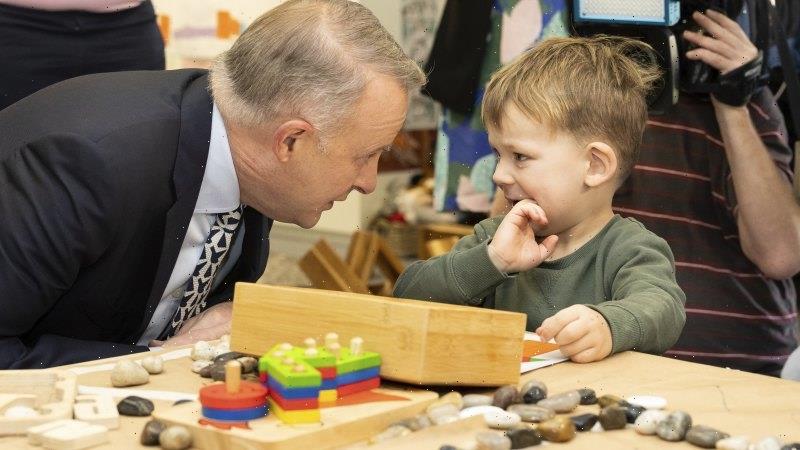A major childcare provider is calling on the government to immediately boost wages in the industry by 10 per cent as a stopgap to prevent staff from abandoning the haemorrhaging sector.
Goodstart Early Learning argues the government can afford the urgent pay bump because its $4.5-billion childcare subsidy program, due to roll out in July, was found to be $900 million cheaper than originally costed.
Anthony Albanese has been urged to give childhood educators a 10 per cent pay rise.Credit:Alex Ellinghausen
Amid a political uproar over Labor’s controversial industrial relations bill, which includes multi-employer bargaining, Prime Minister Anthony Albanese singled out feminised industries such as childcare and aged care as among the most important beneficiaries of the reforms.
Childcare is primed to be the test case after Early Childhood Australia, the peak body for providers, agreed to explore multi-employer bargaining with the United Workers’ Union, but the government will be pressured to pick up the bill for any gains, given it is the primary funding source for early education.
“We want to get wages moving again as soon as possible. That’s our priority. We’ll have constructive discussions with anyone who’s willing to have them,” Albanese said during a press conference in Melbourne on Monday.
Staff are leaving childcare in droves to find work in retail and hospitality, with low pay and burn-out among key reasons there was a record 7300 job vacancies in the sector in September.
Goodstart head of advocacy John Cherry said the non-profit provider, which occupies, at almost 10 per cent, the largest stake of the national market, told a Senate inquiry educators’ pay needed to increase in line with similar roles in primary schools, which is comparable to 30 per cent in most categories. He said Goodstart was unable to do that without increasing parents’ fees by 20 per cent.
Cherry backed multi-employer bargaining to lift wages across the workforce, 63 per cent of which is on the industry award, but said he wanted the government at the table, ready to fund an increase.
“Without government at the table, it would be a long, drawn-out process, with not a lot of return for workers,” Cherry said.
He said an immediate, interim pay bump of 10 per cent provided by the government would help retain workers and allow the sector to cope with demand when parents’ subsidies are increased by up to 90 per cent next year, meaning more than 9000 additional educators would be needed.
“We simply cannot find places for all the children who are presenting to our centres because we cannot find staff,” he said. While he didn’t believe a 10 per cent wage boost was enough, he said they thought it would be “enough to stabilise our workforce”.
The 10 per cent wage supplement, which Cherry said would result in a $370-million net annual cost to the government, is also supported by influential organisation Chief Executive Women, whose president Sam Mostyn was recently appointed to head up the government’s women’s economic equality taskforce.
Cherry said the 10 per cent supplement was an interim measure before the Productivity Commission came back with recommendations of a funding overhaul for the sector, and sector-wide bargaining and equal pay laws were in operation.
Cherry told the inquiry a potential 25 per cent pay increase for aged care workers could pose a challenge for childcare as it could draw workers across. He also said paying more would attract more men to the early education sector.
Early Childhood Education Minister Dr Anne Aly acknowledged the government’s cheaper childcare reforms would only work “if we retain, recruit and train a high-quality workforce, and we have a plan to deliver exactly that”.
“We’re working with the sector and state and territories to find lasting solutions that ensure all communities across the country, including regional, rural and remote communities, have access to early childhood education and care,” Aly said.
She said the government had supported an increase to the minimum wage, which delivered a 4.6 per cent pay rise to childcare workers on industry awards, as well as introducing changes to the Fair Work Act to strengthen bargaining in low-paid, female-dominated sectors.
Early Childhood Australia chief executive Samantha Page said the Goodstart proposal “has a lot of merit”, but the sector needed a more permanent solution that went beyond boosting wages in the short term.
She said there was a risk it would be a win for employers without giving educators “a voice in the process”.
United Workers Union early learning director Helen Gibbons said workers had made clear when they held strikes in September they didn’t want band-aid solutions. “Nobody would turn their nose up at a payment for early educators, but it’s got to be done in a way that’s sustainable and gives them a say over it,” she said.
“With the new multi-employer bargaining laws, we have an opportunity to do this properly, and do it in a way that educators are actively engaged.”
Greens senator Barbara Pocock, who is chairing the Senate inquiry, said it was clear an emergency response was needed to deal with the workforce crisis happening in childcare.
“The 25 per cent wage increase for aged care workers currently being considered by the Fair Work Commission needs to be matched across the care sector for disability and childcare workers as well,” she said.
Cut through the noise of federal politics with news, views and expert analysis from Jacqueline Maley. Subscribers can sign up to our weekly Inside Politics newsletter here.
Most Viewed in Politics
From our partners
Source: Read Full Article

